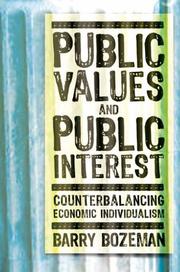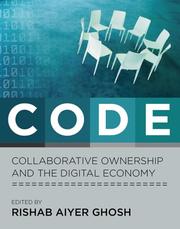| Listing 1 - 2 of 2 |
Sort by
|

ISBN: 9781589011779 1589011775 1589014014 1435627245 9781435627246 9781589014015 Year: 2007 Publisher: Washington, D.C. : Georgetown University Press,
Abstract | Keywords | Export | Availability | Bookmark
 Loading...
Loading...Choose an application
- Reference Manager
- EndNote
- RefWorks (Direct export to RefWorks)
Economic individualism and market-based values dominate today's policymaking and public management circlesùoften at the expense of the common good. In his new book, Barry Bozeman demonstrates the continuing need for public interest theory in government. Public Values and Public Interest offers a direct theoretical challenge to the utility of economic individualism, the prevailing political theory in the western world. The book's arguments are steeped in a practical and practicable theory that advances public interest as a viable and important measure in any analysis of policy or public adminis
Public debt --- Public interest --- Common good --- Public administration. --- Intérêt public --- Bien commun --- Administration publique (Science) --- Economic aspects --- Aspect économique --- #SBIB:35H52 --- #SBIB:17H20 --- #SBIB:17H3 --- Ethiek van bestuur en beleid --- Sociale wijsbegeerte: algemeen --- Politieke wijsbegeerte --- _0 |a Public interest -- Economic aspects. --- Common good -- Economic aspects. --- Public administration --- Political Science --- Law, Politics & Government --- Political Theory of the State --- Public interest -- Economic aspects. --- Economic aspects. --- Intérêt public --- Aspect économique --- Administration, Public --- Delivery of government services --- Government services, Delivery of --- Public management --- Public sector management --- Good, Common --- Public good --- Political science --- Administrative law --- Decentralization in government --- Local government --- Public officers --- Consensus (Social sciences) --- Justice --- State, The

ISBN: 0262572362 0262072602 9786612097805 1423746473 026225624X 1282097806 9780262256247 9781423746478 9780262072601 9780262572361 Year: 2005 Publisher: Cambridge, Massachusetts : [Piscataqay, New Jersey] : MIT Press, IEEE Xplore,
Abstract | Keywords | Export | Availability | Bookmark
 Loading...
Loading...Choose an application
- Reference Manager
- EndNote
- RefWorks (Direct export to RefWorks)
Open source software is considered by many to be a novelty and the open source movement a revolution. Yet the collaborative creation of knowledge has gone on for as long as humans have been able to communicate. CODE looks at the collaborative model of creativity -- with examples ranging from collective ownership in indigenous societies to free software, academic science, and the human genome project -- and finds it an alternative to proprietary frameworks for creativity based on strong intellectual property rights.Intellectual property rights, argues Rishab Ghosh in his introduction, were ostensibly developed to increase creativity; but today, policy decisions that treat knowledge and art as if they were physical forms of property actually threaten to decrease creativity, limit public access to creativity, and discourage collaborative creativity. "Newton should have had to pay a license fee before being allowed even to see how tall the 'shoulders of giants' were, let alone to stand upon them," he writes.The contributors to CODE, from such diverse fields as economics, anthropology, law, and software development, examine collaborative creativity from a variety of perspectives, looking at new and old forms of creative collaboration and the mechanisms emerging to study them. Discussing the philosophically resonant issues of ownership, property, and the commons, they ask if the increasing application of the language of property rights to knowledge and creativity constitutes a second enclosure movement -- or if the worldwide acclaim for free software signifies a renaissance of the commons. Two concluding chapters offer concrete possibilities for both alternatives, with one proposing the establishment of "positive intellectual rights" to information and another issuing a warning against the threats to networked knowledge posed by globalization.
Alliances stratégiques (Affaires) --- Bien commun --- Strategic alliances (Business). --- Electronic commerce --- Strategic alliances (Business) --- Intellectual property --- Group decision making --- Common good --- International cooperation --- Economic aspects --- E-books --- Group decision making. --- Common good. --- Good, Common --- Public good --- Political science --- Consensus (Social sciences) --- Justice --- Public interest --- Collective decision making --- Decision-making, Group --- Decision making --- Alliances in business --- Business alliances, Strategic --- Corporate alliances --- Strategic business alliances --- Strategic corporate alliances --- Strategic partnerships (Business) --- Partnership --- Business networks --- Cybercommerce --- E-business --- E-commerce --- E-tailing --- eBusiness --- eCommerce --- Electronic business --- Internet commerce --- Internet retailing --- Online commerce --- Web retailing --- Commerce --- Information superhighway --- International cooperation. --- Economic aspects. --- Commerce électronique --- Alliances stratégiques (Affaires) --- Propriété intellectuelle --- Décision de groupe --- Coopération internationale --- Aspect économique --- Group decision-making --- Electronic commerce - International cooperation --- Intellectual property - Economic aspects
| Listing 1 - 2 of 2 |
Sort by
|

 Search
Search Feedback
Feedback About
About Help
Help News
News